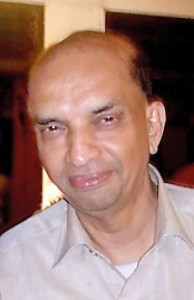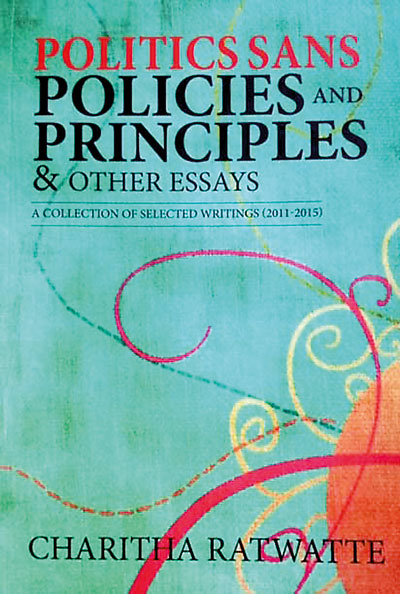Sunday Times 2
Economic patriotism: The nation can ignore these ideas only at its own peril
I just finished reading a rare kind of book. Politics sans Policies and Principles is a collection of essays written by Charitha Ratwatte during his brief spell as a columnist.
The essays concern the deep rooted malaise of our polity. That is not why this book is unusual. Everyone has an opinion about what is wrong in the nation and most opinions get a good run in the media. The book is rare for three reasons.

Charitha Ratwatte
First, it is the work of a serving senior public servant displaying a kind of honesty and courage that many people summon only in the safety of retirement or self-exile overseas. Second, the book is not partisan in the tribal party sense. No political party is spared the book’s relentless scrutiny. In this sense it is a truly patriotic work.
Third, it has a breadth and depth that belies the journalistic style in which some of the chapters were originally written.
Before going further I owe readers a duty of disclosure. The author, Charitha Ratwatte is a life-long friend who schooled with me from kindergarten to law school graduation. In school we knew him as a tenacious slip of a lad who played above his weight whether in the pool, on the rugby field or in the class room. I see that tenacity in this book, in the impressive research and the keen grasp of history and economics grounded in philosophical pragmatism.
The book at its core is an unapologetic defence of liberal democracy against its enemies within and outside. It reaches out to readers at different levels. It serves as a primer on political economy and a pathway to deeper understanding of how our world works. It explains the irremediable failings of statism, corporatism and dirigisme and why democratic capitalism restrained by sensible rules offers the best and fastest means of economic emancipation of the poor around the world. The evidence is stark if we care to look around the world. Nations that leave space for private enterprise and limit the power of the state are rich and those where the state rules the economy remain poor.
However as Ratwatte points out, efficient markets are not anarchic. ‘A rule-based system within which investors can operate, which is transparent and fair, where the rule of law applies is a fundamental requirement’. Ratwatte wisely reserves judgment on the Chinese economic model that he calls a work in progress.
So why do nations continue to ignore the winners and imitate the losers? As Ratwatte shows there are many factors at work, too many to discuss here. But two of these deserve our closest attention. One is the fatal attraction of populism. It is now causing alarm in Western democracies but Sri Lankans have lived and practised it for decades. The electorate continues to be duped by unaffordable promises of politicians. When they fail we punish them at the ballot box only to hand power to the other lot who promise even more pies in the sky.
The other factor is the failure to educate the public about the dynamic of economic growth which the economist Joseph Schumpeter called ‘creative destruction’. This is when uncompetitive industries die and capital and labour move to more productive fields. This process, in Ratwatte’s words ‘is as organic as human evolution … sustaining an ever expanding, evolving economic process’. State capitalists fear and resist creative destruction as they cannot control it. So they invest public money to sustain rusting industries run by cronies causing an unending downward spiral of the economy. They play on the people’s fear of disruption to resist reform and keep control of public assets that inevitably end in private gain.
Ratwatte’s essay on ‘The Limits to Power’ is particularly insightful. It echoes some of the ground-breaking work in institutional theory that won economists Douglass North and Elinor Ostrom their Nobel Prizes. The prosperity and the liberal democratic way of life depend not only on formal enforceable laws but also on the intangible social and moral norms which have grown with civilised living.
In fact the formal law cannot exist without the sustaining force of a widely shared system of values for the law has no life but in the conduct of men and women. Sri Lanka’s recent history provides living proof of this thesis. Our Constitution and basic laws have been distorted by moral decay in public and private life. Perfectly good laws that once guarded the public interest became instruments of oppression and aggrandisement as our moral sensibilities were dulled and expectations lowered by the spreading misdeeds of politicians and their cronies.
Ratwatte offers solutions. He would strengthen constitutional checks and balances including the creation of a Senate. ‘Unchecked democracies’, he says, ‘are prone to short termism, like countries running high deficits, which are a tax on the unborn, and having high inflation, which is a tax on the poor’.
He also proposes term limits, electoral reforms and oversight of appointments to higher office. Remember that these essays predate the reforms of the 19th Amendment that implemented many of these ideas. Electoral reforms are on the agenda of the current constitutional project as are some other proposals in the collection of essays.
This dollection is not current, which is a bit of a pity. Ratwatte wonders how democracy throws up populist Clowns like Venezuelan strong man Hugo Chavez and Italy’s Silvio Berlusconi and Beppe Grillo. Hugo is dead and Silvio is sidelined. But democracy has given us Donald Trump who is the funniest of them but for the fact that he is also the most dangerous. Trump would indeed be funny but for the danger he poses to the world. Trump arrived too late for this book. The time-tested checks of constitutional democracy, as Ratwatte points out, are our only means to control the clowns.
The nation can ignore the central ideas in this collection of essays only at its own peril, which is reason enough for every patriot to read it.
(Suri Ratnapala is an emeritus professor of law at the University of Queensland)
| Book facts | |
| Politics sans Policies and Principles & Other Essays by Charitha Ratwatte Published by Sarasavi Publishers, 2017. Price: Rs.600. Available at Sarasavi Publishers outlets |

